MercoPress. South Atlantic News Agency
Tag: Xi Jinping
-
Wednesday, November 7th 2018 - 08:43 UTC
US and China agree to a top level meeting next Friday to ease bitter disputes

The United States and China will hold a delayed top-level security dialogue on Friday, the latest sign of a thaw in relations, as China’s vice president said Beijing was willing to talk with Washington to resolve their bitter trade dispute.
-
Friday, November 2nd 2018 - 07:37 UTC
US/China trade talks “moving along nicely”; Trump and Xi plan to meet at G20 in Argentina
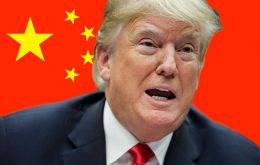
U.S. President Donald Trump and Chinese President Xi Jinping both expressed optimism on Thursday about resolving their bitter trade disputes ahead of a high-stakes meeting planned for the two leaders at the end of November in Argentina.
-
Wednesday, October 24th 2018 - 08:55 UTC
Trump-Xi summit in Buenos Aires next month announced the White House

President Trump and his Chinese counterpart Xi Jinping will meet at the G-20 summit in Argentina next month, the White House announced on Tuesday, amid an escalating trade war between the world’s two largest economies. The G-20 Summit, comprising top 20 economies of the world, including India, is scheduled to take place in Buenos Aires in Argentine on November 30 and December 1.
-
Monday, October 8th 2018 - 08:17 UTC
China admits to be investigating head of Interpol on “suspected law violations”
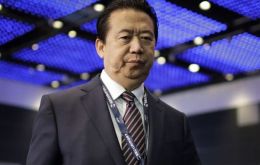
China on Sunday said it was investigating Interpol's President Meng Hongwei, who went missing in September, over “suspected law violations”. The international police agency then announced it had received Meng's resignation.
-
Wednesday, September 19th 2018 - 08:11 UTC
China agreed to invest US$ 5bn in Venezuelan oil, alleges Maduro
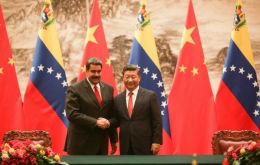
Venezuelan President Nicolas Maduro said on Tuesday that new investments from China will help his country dramatically boost its oil production, doubling down on financing from the Asian nation to turn around its crashing economy.
-
Friday, September 14th 2018 - 08:50 UTC
Maduro in China after more financial support to prop Venezuela's collapsing economy and oil output
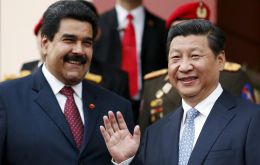
Venezuelan President Nicolas Maduro is travelling to China to discuss economic agreements, as the crisis-struck OPEC nation seeks to convince its key Asian financier to disburse fresh loans.
-
Thursday, September 6th 2018 - 08:12 UTC
Trump says the US is not yet ready to reach a trade agreement with China

U.S. President Donald Trump said on Wednesday that the United States was not yet ready to come to an agreement over trade disputes with China but he said talks would continue.
-
Saturday, July 21st 2018 - 08:29 UTC
Trump prepared to slap tariffs con all Chinese goods imported to United States

President Donald Trump has indicated that he is willing to slap tariffs on every Chinese goods imported to the U.S. should the need arise.“I'm ready to go to 500,” the president told CNBC's Joe Kernen in a “Squawk Box” interview aired Friday.
-
Friday, June 29th 2018 - 09:13 UTC
Beijing eases limits on foreign investment in banks, car industry and agriculture
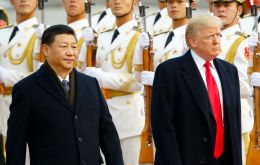
The Chinese government has eased rules that limit foreign investment in the country's banks, car industry and agriculture. The barriers have drawn criticism from trading partners, including the US. The Trump administration cited the rules as an example of unfair practices when it announced plans for tariffs on Chinese goods earlier this year.
-
Wednesday, June 20th 2018 - 09:12 UTC
Kim in China underlines “friendship, unity and cooperation” with Beijing
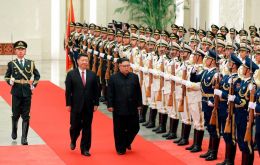
Kim Jong Un declared North Korea's unstinting “friendship, unity and cooperation” with Beijing during his third visit to China this year, in a show of loyalty to his main ally following a landmark summit with US President Donald Trump.
